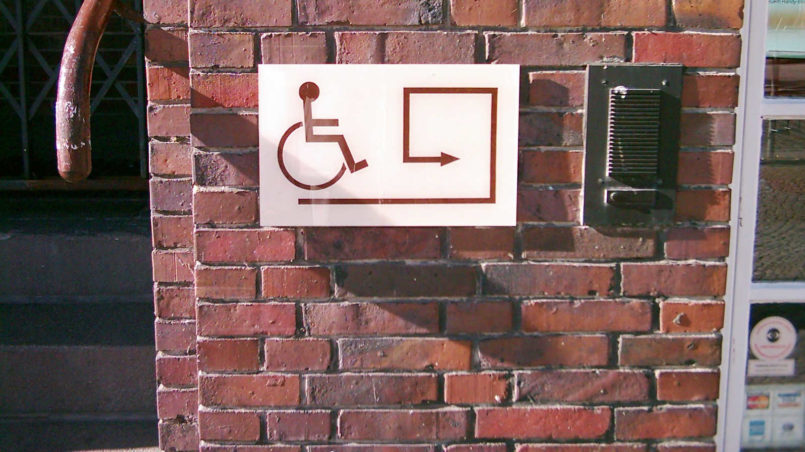Dealing with Disability in the Developing World

Disability is a major challenge in the developing world. Disabled people are in this world not by their own choice. The prompt identification of people with disabilities and care for them is essential.
Can you imagine that you get up in the morning and you have such severe pain in your legs that you cannot move, cannot even get out of your bed? Can you imagine yourself having such pain that you need assistance to do very simple day-to-day activities? Can you imagine yourself being fired from your job because you are unable to perform simple job requirements? Can you imagine your child crying for a hug but you are unable to hold him due to the pain in your bones and joints? And finally, can you imagine that children who are mentally disabled are chained up as is done in developing countries?
Each of us has different levels of capability and many people require support from society in their daily lives.
We do not refer to people as handicapped; we are beginning to call them special children or special people. He or she is special, which is why we have to look after them a little more than we look after others.
Disease, injuries and birth defects – all these are realities of life. It is true we would like to see that everyone has legs, but if it happens that somebody does not, it needs not become a great misery for him or her. People can support others to ensure that their lives are not that difficult. Rather than a personal problem, it is a social problem which has to be addressed.
Disability is part of the human condition. Almost everyone will be temporarily or permanently impaired at some point in their lives and those who survive to old age will experience increasing difficulties in functioning. Most extended families have a disabled member, and many non-disabled people take responsibility for supporting and caring for their relatives and friends with disabilities.
13-year-old Raju is autistic. He sits aloof, doesn’t communicate with his peers and is sometimes hyperactive.
Raju’s 46-year-old mother, a teacher by profession, knew that her second child was different when Raju did not utter “ama” and “buwa” while other children of his age did. She took him to a hospital, but the doctors did not diagnose autism. Instead, they told her that he was slow in developing his speech skills and that the problem was minor.
She took him to different schools. But a few days after enrollment, the schools would refuse to take him because they knew that he was different. At first, they admitted him but, when they knew he was somewhat different from others, they asked her to take him out of school. Raju’s mother said that those were the most painful situations in her life.
Later, Raju was diagnosed with autism and his mother was put into contact with a special school for children with special needs where Raju was admitted. Raju is lucky to be attending such a special school as there are many children with a disability who are deprived of their basic rights.
Children with intellectual disabilities (sometimes called “cognitive disabilities” or, previously, “mental retardation”) may take longer to learn to speak, walk, and take care of their personal needs, such as dressing or eating. They are likely to have trouble learning at school. They will learn, but it will take them longer. There may, however, be some things that they simply cannot learn.
As I move through the rural communities of my home country Nepal, I come across children with intellectual disabilities. They are like a burden to their family. The children are left alone at home as most of the parents have to work in their fields. There are no such special schools in most of the rural communities in Nepal.
Various genetic conditions, problems during pregnancy, problems at birth and many health problems are the major causes of disability.
Emphasis should be placed on educating affected families about disability. The government should provide schools for children with special needs.
Firstly, for those with intellectual disabilities, there is a need to train them adaptive skills. Many children with intellectual disabilities need help with adaptive skills, which are skills needed to live, work and play in the community. Teachers and parents can help a child develop these skills at school and at home.
Secondly, transition planning is essential for families and schools in order to help children in their transition into the world of adulthood, because intellectual disabilities affect how quickly and how well an individual learns new information and skills.
There is a great need to give love and care to people with disabilities. The world must join hands together to solve this social problem.
Credits
| Image | Title | Author | License |
|---|---|---|---|
 |
Wegweiser_Rollstuhlfahrer_1 | GeorgHH | CC BY-SA 3.0 |

It is really heart touching and true sir. Even in urban areas of country,there are very few schools for them.
This need some action to solve this issue.
Great work sir….it is crucial we focus on education,awareness, and livelihood promotion program are emphasized in rural areas particularly.
I read your articles and it touches my heart.I hope your articles inspire the people and let them know about disabilities. And i hope people will join us to solve the social problem.
Dear sir, I will like to congratulate for your New article and thank you for sharing it. You have been doing great things since we met each other for the very first time and today I’m so glad to knew about your new article..well, I think there’s no great disability in society,then the inability to see a person as more.”
” children with disabilities are like BUTTERFLIES with a broken WING,They are just a beautiful as all other,but they need HELP to Spread their WINGS.”..so there’s a grate need to give love and care to people with disability…..Keep CLAM and Bring More Disability AWARENESS..don’t make fun of people with disabilities, weather it’s Neurological, Mental,physical and more, They are people too, They have felling..
Nice write up sir. Private sector which include autism care home, cerebral palsy home in Nepal is playing vital role in supporting the children with special needs. I hope Government of Nepal will also come up with the plan and immediate implementation addressing disability.
Brilliant piece of Information.